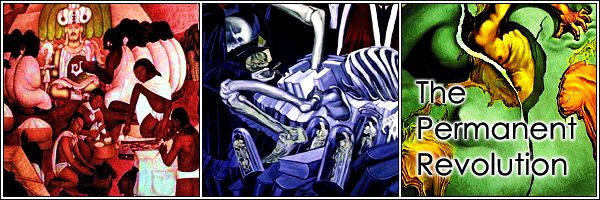Science, the State and Unknown Unknowns
Tom Friedman's latest article bandies out an idea we haven't heard in a while: fusion. In this week's article he ore that, there is the mandatory colorful half/joke half anecdote.
This might not be the best way to open a column arguing that fusion researchers are not crackpots, but I am nonetheless inclined to agree with his sentiment. History is full of examples of hare-brained schemes succeeding, though often not at the initial mission they set out for. There is Christopher Columbus's successful lobbying of the Spanish monarchy for funds to go round the world to India. There is the Manhattan Project which led to a less bloody victory over Japan, made WW3 simultaneously less likely and unimaginably more destructive. The internet was created as an offshoot of the many billions spent in the Space Race and technological competition with the Soviet Union.
All these projects involved a supreme act of imagination to foresee their consequences. What European in 1491 could guess that a New World could be found, a world they would flock to in the millions to find better lives, and eventually return to the Old to save it on more than one occasion? Who until Einstein could imagine the human ability to end the world, an act which had previously only been conceived of in texts such as the Book of Revelation? In 1930, Spanish philosopher Jose Ortega y Gasset expressed amazement that he could read in his newspaper about the ongoing expeditions to the North Pole and 'that icebergs passed drifting against the burning background of the Andalusian landscape.' How would he respond when today hundreds of millions (billions?) of people communicate with each other at a moment's notice, through text, Skype, video, music?
This is why Science Fiction is so important. It allows us to speculate on hypothetical situations, that may seem perfectly implausible to us today, but which have features that may well characterize the future. There are too many, as Donald Rumsfeld so eloquently put it, "unknown unknowns" for us to assume anything will remain constant is foolish. The whole of human history attests to that, and with emergence of science and industry, that has grown exponentially truer.
For all this, we need to keep an open mind and invest human and financial resources into projects like space exploration, stem-cell research (recently re-approved by Obama), the Joint European Torus and CERN are so important. It is not that by pumping billions we'll end up with a Mars colony or ditch fossil fuels in favor of cold fusion. The vast majority of these kinds of projects will in all likelihood amount to nothing. The advances some would make however, in knowledge and ability, would in fact be greater than our ability to imagine.
You’ll hear about someone who’s invented a process to convert coal into vegetable oil in his garage and someone else who has a duck in his basement that paddles a wheel, blows up a balloon, turns a turbine and creates enough electricity to power his doghouse.I love how Tom writes the way he speaks..
This might not be the best way to open a column arguing that fusion researchers are not crackpots, but I am nonetheless inclined to agree with his sentiment. History is full of examples of hare-brained schemes succeeding, though often not at the initial mission they set out for. There is Christopher Columbus's successful lobbying of the Spanish monarchy for funds to go round the world to India. There is the Manhattan Project which led to a less bloody victory over Japan, made WW3 simultaneously less likely and unimaginably more destructive. The internet was created as an offshoot of the many billions spent in the Space Race and technological competition with the Soviet Union.
All these projects involved a supreme act of imagination to foresee their consequences. What European in 1491 could guess that a New World could be found, a world they would flock to in the millions to find better lives, and eventually return to the Old to save it on more than one occasion? Who until Einstein could imagine the human ability to end the world, an act which had previously only been conceived of in texts such as the Book of Revelation? In 1930, Spanish philosopher Jose Ortega y Gasset expressed amazement that he could read in his newspaper about the ongoing expeditions to the North Pole and 'that icebergs passed drifting against the burning background of the Andalusian landscape.' How would he respond when today hundreds of millions (billions?) of people communicate with each other at a moment's notice, through text, Skype, video, music?
This is why Science Fiction is so important. It allows us to speculate on hypothetical situations, that may seem perfectly implausible to us today, but which have features that may well characterize the future. There are too many, as Donald Rumsfeld so eloquently put it, "unknown unknowns" for us to assume anything will remain constant is foolish. The whole of human history attests to that, and with emergence of science and industry, that has grown exponentially truer.
For all this, we need to keep an open mind and invest human and financial resources into projects like space exploration, stem-cell research (recently re-approved by Obama), the Joint European Torus and CERN are so important. It is not that by pumping billions we'll end up with a Mars colony or ditch fossil fuels in favor of cold fusion. The vast majority of these kinds of projects will in all likelihood amount to nothing. The advances some would make however, in knowledge and ability, would in fact be greater than our ability to imagine.
Labels: Science Fiction, technology, Tom Friedman



3 Comments:
not to be a pain in the ass but you seem to have lost momentum (or at the least have stopped posting your writings)
I've been busy fairly busy as of late (archives and whatnot). The latest piece, one on Nixon/foreign policy, has become a mediocre, inexcusably long rambling piece. More to come.
This comment has been removed by a blog administrator.
Post a Comment
<< Home